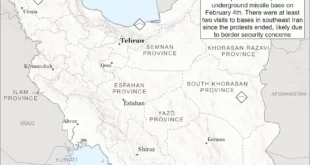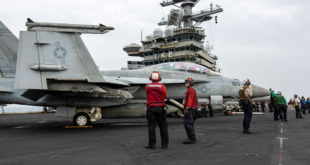 UNITED NATIONS (AFP) — The Security Council was to debate changes Thursday to a draft resolution toughening UN sanctions on Iran as sponsors stressed the importance of a united response to Tehran’s nuclear defiance.
UNITED NATIONS (AFP) — The Security Council was to debate changes Thursday to a draft resolution toughening UN sanctions on Iran as sponsors stressed the importance of a united response to Tehran’s nuclear defiance.
The full 15-member Security Council was to meet behind closed doors at 5:00pm (2100 GMT) to discuss changes to a sanctions package agreed by six major powers last week followed amendments submitted by non-permanent members South Africa, Indonesia and Qatar.
The original draft, crafted by the council’s five veto-wielding permanent members — Britain, China, France, Russia and the United States — plus Germany, broadens sanctions already adopted by the council in December after Iran repeatedly refused to halt uranium enrichment.
It would ban Tehran from exporting arms, call for voluntary trade sanctions and expand a list of officials and companies targeted for financial and travel restrictions.
Western powers believe Iran’s nuclear programme is a cover for making atomic weapons. Iran insists it needs uranium enrichment to produce fuel for generating electricity.
Meanwhile, Tehran announced it had launched naval military exercises, codenamed “Power”, in the Gulf in a display of the Islamic republic’s “power and defence capability”. “During these manoeuvres frigates equipped with missiles, warships, air-to-sea missiles and sea-to-air missiles are being used, as well as tactical reconnaissance submarines,” Admiral Sajad Kushaki told state television.
“The Iranian people will not allow a single American soldier to set foot on their soil.” In Paris, French Foreign Minister Philippe Douste-Blazy spoke by telephone with his South African and Qatari counterparts about their respective amendments to the sanctions resolution, his office said.
“We want to take as much time as necessary for this dialogue to examine suggestions which have been made,” French foreign ministry spokesman Jean-Baptiste Mattei said.
“We are keen to maintain the unity of the international community.” British Foreign Secretary Margaret Beckett, on a visit to Qatar as part of a Gulf tour, also discussed the nuclear issue with her Qatari counterpart, Sheikh Hamad Ben Jassem Ben Jaber Al Thani.
Qatar and Indonesia have both proposed including in the draft a paragraph recalling the goal of a “Middle East free from weapons of mass destruction and all missiles for their delivery”.
Â
But a South African proposal for a 90-day suspension of UN sanctions to allow political negotiations with Tehran was dismissed by the sponsors as “not consistent with the basic construct” of the sanctions resolution, a Western diplomat said.
South Africa also suggested deleting the weapons ban and many financial sanctions which, if accepted, Western diplomats said, would gut much of the draft.
“Some of those amendments are quite reasonable and indeed add to the value of the resolution,” Russian Ambassador Vitaly Churkin told reporters Thursday.
“We’ll see tonight. If there is a feeling the 15 members of the council are comfortable with the text, that the amendments are acceptable to everybody, we could have a vote by the end of the week,” he added.
“For us and I think for others of the six [major powers], the unity of the council, a good atmosphere within the council, a respectful attitude toward each other is more important than the exact timing, so if it takes a few more days [for a vote], so be it,” Churkin said.
Iranian President Mahmoud Ahmadinejad has said he plans to travel to New York to attend the Security Council vote on the sanctions and has been issued a visa by US authorities.
South Africa, which dismantled its nuclear weapons programme in the early 1990s during its transition from white minority rule, has consistently defended Iran’s right to enrich uranium for peaceful purposes.
Its ambassador Dumisani Kumalo, who chairs the Council this month, said any new draft must respect Iran’s “right to the peaceful use of nuclear [energy].” It should also assert the leading role of the International Atomic Energy Agency, the UN nuclear monitoring group, in determining the nature of the Iranian atomic programme, Kumalo said.
In Iran, supreme leader Ayatollah Ali Khamenei remained defiant Wednesday, warning in a nationally televised speech that Iran would do whatever it could to defend itself from force or the threat of force.
 Eurasia Press & News
Eurasia Press & News



